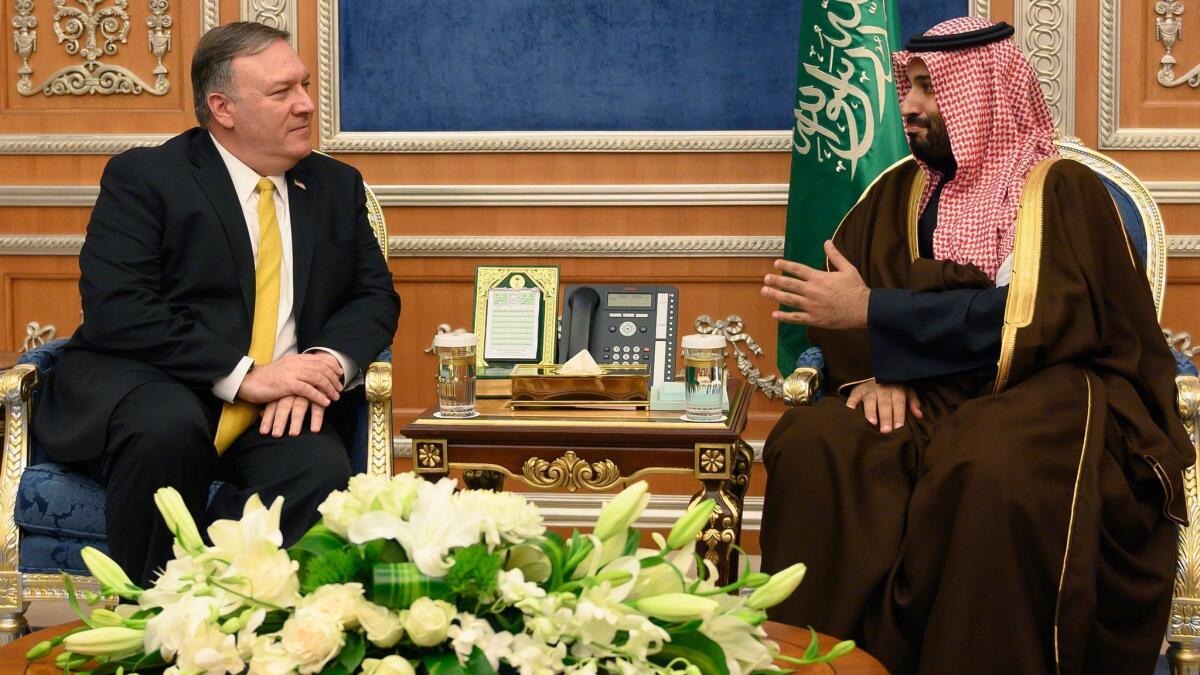Pompeo presses Saudi crown prince for accountability on Khashoggi slaying

- Share via
Reporting from RIYADH, Saudi Arabia — Secretary of State Michael R. Pompeo on Monday pressed the Saudi crown prince to hold accountable “every single person” involved in the killing of U.S.-based Saudi journalist Jamal Khashoggi, but he reported no progress in the case that has strained U.S. relations with the desert kingdom.
“Our expectations have been clear from early on,” Pompeo said. The Saudi leadership reiterated its commitment to punishing the killers, Pompeo said, but still has to “work through a fact process.”
More than 100 days have passed since Khashoggi was killed inside the Saudi consulate in Istanbul, Turkey, and many critics, journalist advocates and human rights activists have accused Riyadh of fingering a handful of scapegoats but avoiding blaming the masterminds. The U.S intelligence community concluded that Crown Prince Mohammed bin Salman, the de facto ruler of Saudi Arabia, likely ordered the killing.
But the Trump administration has made clear it values the bilateral U.S.-Saudi relationship, including lucrative arms deals, over an individual human rights case.
Pompeo met with Mohammed, much of it one-on-one, for about 45 minutes inside the ornate royal palace, his second such sit-down since Khashoggi’s death. After the first meeting, Pompeo was widely criticized for laughing and appearing overly chummy with the prince, who is also largely responsible for the disastrous war in Yemen. This time, Pompeo smiled politely but appeared more subdued and serious.
Speaking later to reporters at Riyadh’s King Khalid airport, Pompeo downplayed the harm caused to U.S.-Saudi relations by the Khashoggi case. “Our relationship is with the Kingdom of Saudi Arabia,” he said. “That is the strategic partnership.”
A bipartisan bloc of congressional members has demanded the administration suspend arms sales to Saudi Arabia over its abysmal human rights record and the Saudi-led, U.S.-backed war in Yemen that has killed tens of thousands of civilians and plunged the country into famine and a humanitarian crisis.
Pompeo did make a rare mention of female activists in Saudi Arabia whom the government has arrested and allegedly tortured. The sister of one of the women, Loujain Hathloul, published a dramatic op-ed piece in the New York Times this week, pleading that Pompeo take up her case.
Pompeo will end his multinational swing through the Middle East later Monday, cutting it short by one day and one country because of a family death.
In the course of seven days, he managed to touch down in eight capitals: Amman, Jordan; Baghdad; Cairo; Manama, Bahrain; Abu Dhabi, United Arab Emirates; Doha, Qatar; Riyadh and finally Muscat, Oman.
His overarching goal has been to shore up an anti-Iran coalition, especially after President Trump’s abrupt decision to withdraw American troops from Syria sowed confusion and doubt about the administration’s commitment.
His centerpiece event was a speech in Cairo, which his staff portrayed as a major policy address on the Middle East. Reaction to the hard-line speech, however, was mixed and, for some regional leaders, tone-deaf.
The belligerently anti-Iran stance plays well in Saudi Arabia and Israel, but less so in other parts of the region.
“Egypt, for example, fears Turkey more than it does Iran,” said Oraib Rantawi, director of the Amman-based Al Quds Center think tank. “Jordan has other concerns, like the Palestinian peace process.”
In Iraq, Pompeo’s words also brought new fears, since the country has depended so heavily on both the United States and Iran in its fight to oust Islamic State militants from the country.
“Iraq can never be part of an anti-Iran coalition,” said Raed Fahmi, secretary of Iraq’s Communist Party and a former minister for science and technology. “The dependency is there.”
A week after Pompeo landed in Baghdad and Irbil, the Iranian foreign minister, Mohammad Javad Zarif, followed the exact same itinerary.
Pompeo has also had to try to soothe allies over Trump’s abrupt announcement of his intent to withdraw from Syria, glossing over the stream of contradictions emerging from Washington over what exactly is being planned.
Trump, who initially, apparently, decided to pull the plug on Syria after a telephone call with Turkish President Recep Tayyip Erdogan, now appears to have backtracked and has threatened Turkey with “economic disaster” if it doesn’t care for the Kurds, something that Erdogan was not likely ever to do.
Wilkinson reported from Riyadh and Bulos from Mosul, Iraq.
More to Read
Sign up for Essential California
The most important California stories and recommendations in your inbox every morning.
You may occasionally receive promotional content from the Los Angeles Times.












